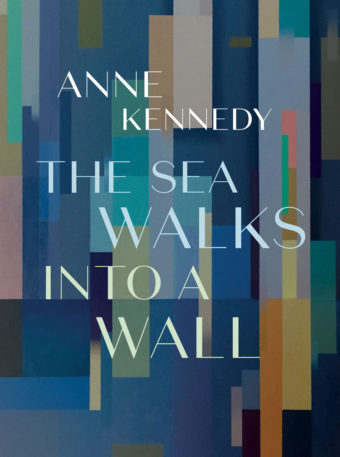It’s obvious from The Sea Walks into a Wall that Anne Kennedy is a writer for whom form ignites language. Some poems in this collection are built of couplets, some are slabs of unending anaphora, some use lines of conspicuously alternating lengths, and some, like the title poem, are elastic and elongated, a blend of the syntax and logic of essay and the enjambment and crunch of verse. I can imagine Kennedy stretching and condensing each piece here until it relaxed perfectly into its final shape, and that satisfaction is one of the collection’s many joys.
But what astounds me here, beyond technical experiment, is the overwhelming breadth of what is seen, encompassed, pressed into words. This is a collection of perpetual opening, so overwhelming in some poems that I can’t catch my breath. ‘The Arrivals’ is one of these.
if on arrival there is wringing of hands
we will shake hands
and in the eye of a storm we will make tea
with our brilliant
fading bodies we will do a variety of things
while we can
we will bed down on the steps of the assembly
if we have to
we will bed down in a court of law
and all beds
anyway are temporary and when we see
that
and realise we have travelled through the night
we have travelled
and are not turning back that
will be the point
at which we arrive
As with much of Kennedy’s work, this poem is not tricky, but it is sly, always folding back on itself before propelling forward. We are bounced from the monumental, the storm, to the tiny domestic act of tea-making, then launched into matters of the spirit, the ‘fading bodies’. The tonal retreat into the bureaucratic language of ‘a variety of things’ comes just before we lurch into references to protest, which themselves fade into the poem’s hugeness, its journey, and its generosity of pronoun, the ‘we’ by which every reader is included. Each object of attention is magnified just for a second before it slips out of view, as if Kennedy has the world in a prism, trapped and turning, refracting perfectly.
It’s wrong, though, to so quickly pass by that reference to political protest. The collection’s title is only the first sign that, within these poems, all is not well. The sea hates the wall. The stream is sick. And — over and over again, in the list poem ‘An Hour’, ‘The person of the hour just earned the minimum wage less tax.’ This collection deals with unease — in and with nature, and between each other on personal and governmental levels — to the point of necessary exhaustion. Yet Kennedy captures and notates voice with precision, so the more obviously political passages and poems read not as cold castigation or censure, but as wholehearted woe, frustration, stubbornness, and apathy, and though anger is here, as it should be, it isn’t overly justified as to become self-righteous.
‘Light On in the Garden’, one of the longer, more essayistic poems of the collection, is also one of the angriest. It’s a narrative of many layers of inequality, ignorance and the tension between money and art:
The guys on the exec team hate art.
They watch a movie sometimes, hum along to a tune in the car,
buy jewellery for their wives,
but the guys on the polytech executive team really hate art.
Surely they visit the Met when
in New York, used to moondance in their twenties,
and they all wear clothes,
but sadly the members of the polytechnic executive committee
hate art.
It’s a seething, sarcastic poem, and Kennedy is not trying to hide those colours; yet there’s still space in this poem, as with any good poem, any Kennedy poem, for warmth to build. The space is created, first only a little, in the humming, the moondancing, and the tongue-in-cheek ‘they all wear clothes’. In the following sections, the poem grows in both whimsy and incision, stretches into absurd prose in a style similar to that of Joe Wenderoth or Lydia Davis, and ends in a pantomimic exclamation of ‘Noooooooo!’ — the voice of a member of the exec team who, having discovered the dangerous ecstasy of art, has blamed the art school for his newly opened world, and has shut it down and driven away.
All this is a lot for one poem of a few pages. But the poem is successful, like so many in this collection, because Kennedy has created space where space is needed, and has taken the opportunity for didacticism, because she can. Kennedy is a poet who knows just how far to stretch tone and form in each extended piece to concoct a balance of richness, excitement and patience that delivers these poems to, instead of hiding them from, the reader.
The Sea Walks into a Wall is impressive not simply because of its range of tone and voice or its display of the depth of Kennedy’s craft. In fact, ‘impressive’ isn’t the word I want to use anyway. What I want to say is, I’m moved by this collection’s insistence on abundance, humour, and delight in a world of tension and lack. That even within the restrictions of a pandemic, ‘I’ll meet you in paradise in my mask’. There’s a constant tussle between fear and bliss: ‘We were shit-scared and so happy’, Kennedy writes from the chaos of a storm. And everything returns to the sea, its giving and taking, its coming and leaving:
and the animals on the land
and the fish in the sea
and the thoughts in our heads
and the living and the dead
rising and falling.
This review was originally published on the Academy of NZ Literature site.



